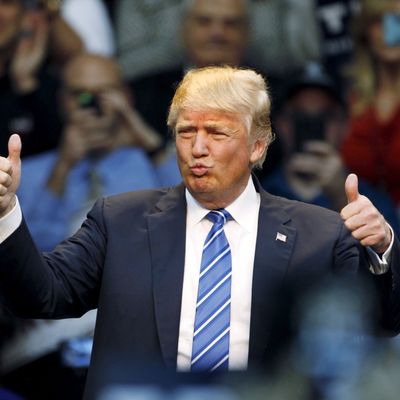
Every time there is a contested presidential nomination, at some point in the cycle jaded political observers with looming deadlines resort to writing about the possibility of a “brokered convention.” The term itself is more than a bit specious: Since there are no longer any “power brokers” who could “broker” a convention, the more feasible possibility is really a contested convention. Even that is remote enough: The 1952 Democratic convention was the last to go to more than one ballot, and the 1976 Republican conclave was the last to assemble with any real doubt about the identity of the presidential nominee. But this has already been a strange cycle.
It should come as no surprise that the “contested convention” talk is a by-product of the exceptional unease of Establishment Republicans with the candidate who currently leads national and most state polls of the GOP field, Donald Trump.
It was enough to attract the attention today of ace political reporters Tom Hamburger and Robert Costa of the Washington Post:
Republican officials and leading figures in the party’s establishment are now preparing for the possibility of a brokered convention as Donald Trump continues sit atop the polls and the presidential race.
More than 20 of them convened Monday for a dinner held by Republican National Committee Chairman Reince Priebus, where the prospect of Trump nearing next year’s nominating convention in Cleveland with a significant number of delegates dominated the discussion, according to five people familiar with the meeting.
Considering that scenario as Priebus and Senate Majority Leader Mitch McConnell (R-Ky.) listened, several longtime power brokers argued that if the controversial billionaire storms through the primaries, the party’s establishment must lay the groundwork for a floor fight, in which the GOP’s mainstream wing could coalesce around an alternative, the people said.
That’s a sufficiently incendiary idea that GOP pooh-bahs felt the need for some disclaimers.
Because of the sensitivity of the topic — and wary of saying something that, if leaked, would provoke Trump to bolt the party and mount an independent bid — Priebus and McConnell were mostly quiet during the back and forth. They did not signal support for an overt anti-Trump effort.
But near the end, McConnell and Priebus did acknowledge to the group that a deadlocked convention is indeed something the party should prepare for, both institutionally at the RNC and politically at all levels in the coming months.
Since conventions don’t just deadlock themselves, it’s questionable that the very concept would be under discussion unless a serious backlash was contemplated against the possible handiwork of Republican primary voters.
Perhaps coincidentally, one of the conservative media’s premier political analysts, RealClearPolitics’ Sean Trende, published a piece today that casually suggested the odds of a contested convention are the “most likely single outcome:”
My most likely scenario is still that no one wins a sufficient number of delegates to claim the nomination. As Nate Silver lays it out, this comes in three different “flavors”: (1) No one wins, but someone is close enough that the writing is on the wall; (2) no one wins, but things get sorted out at the convention; (3) no one wins, and it is fought out on the convention floor. I agree with Silver that these are presented in decreasing order of likelihood, and actually put the overall percentages lower than he did (and lower than I did last winter).
But I still think there’s a very good chance this happens, for a lot of the reasons I wrote about in January. It’s a deep field, without an overall frontrunner; super PACs can keep candidates standing past their normal expiration date; and (perhaps most importantly) the calendar creates incentives for candidates to stay in as long as they can. After the early proportional representation states is a treasure-trove of winner-take-all states, which could catapult an also-ran to first place.
It’s one thing to dispassionately look at the possibility of something crazy like this happening, and another altogether to work to make it happen and plan to exploit it, as it seems the cabal Costa and Hamburger wrote about is doing. Either way, it’s an exciting prospect for the chattering classes.






























